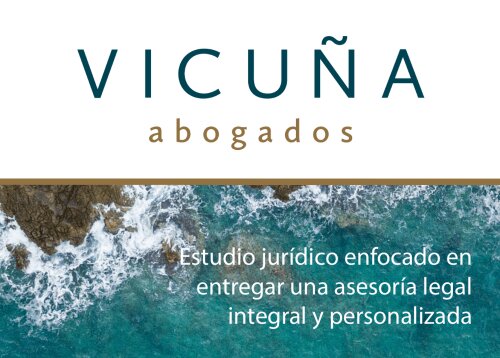Best Conveyancing Lawyers in Las Condes
Share your needs with us, get contacted by law firms.
Free. Takes 2 min.
Free Guide to Hiring a Real Estate Lawyer
List of the best lawyers in Las Condes, Chile
About Conveyancing Law in Las Condes, Chile
Conveyancing refers to the legal process of transferring property ownership from one person to another. In Las Condes, a district within Santiago, Chile, conveyancing is a complex procedure governed by national Chilean law and further influenced by local practices and regulations. The process typically involves the drafting and registration of contracts, title searches, obtaining certifications, payment of taxes, and the official transfer of title at the Real Estate Registry. Because property transactions are often significant financial undertakings, proper legal guidance is essential to ensure a smooth and lawful transfer.
Why You May Need a Lawyer
Engaging a lawyer for conveyancing in Las Condes is highly advisable due to the strict procedural and legal requirements. Some common situations where legal help is necessary include:
- Purchasing or selling residential, commercial, or industrial property
- Ensuring the property title is clear and free from encumbrances
- Resolving disputes over boundaries or ownership
- Preparing and reviewing contracts to protect your interests
- Handling inheritance issues involving real estate
- Assisting with the payment of relevant taxes and municipal charges
- Navigating mortgage documentation and lender requirements
- Representing foreign buyers unfamiliar with local laws
- Dealing with liens, easements, or other charges on the property
- Registering the title transfer before the relevant authorities
Local Laws Overview
Conveyancing in Las Condes is primarily regulated by the Chilean Civil Code and specific regulations concerning property registration (Registro de Propiedad), urban planning, and municipal ordinances. Key aspects include:
- All property sales must be formalized through a public deed signed before a notary public
- Title clearance generally requires a search of property history for at least ten years to verify ownership and identify any existing mortgages or restrictions
- The Real Estate Conservator (Conservador de Bienes Raíces) is the public office responsible for registering property titles
- Payment of the property transfer tax (Impuesto al Traspaso de Bienes Raíces) is mandatory
- Foreign buyers must obtain a Chilean tax ID (RUT) to purchase property
- Municipal clearance and compliance with local zoning and tax obligations must be confirmed before transfer
- Regulations regarding co-ownership properties (such as apartments) may involve additional documentation and certifying compliance with building administration rules
Frequently Asked Questions
What documents are required for buying or selling property in Las Condes?
Generally, you need the title deed, proof of property tax payments, property certificates from the Real Estate Conservator, a current valuation certificate, and personal identification documents. Additional documents may be required for properties under co-ownership or with existing mortgages.
Do I have to use a notary public?
Yes, all property transfer deeds must be signed before a notary public. The notary ensures the legality of the process and retains an official copy of the deed.
What is the role of the Real Estate Conservator?
The Real Estate Conservator is responsible for registering all property transfers, mortgages, and liens within its district. Registration is essential for your ownership rights to be recognized.
How do I know if the property has debts or legal issues?
A lawyer can conduct a detailed title search through the Real Estate Conservator's office to check for existing mortgages, liens, unpaid property taxes, or legal disputes associated with the property.
Are there any restrictions for foreign buyers in Las Condes?
Foreigners can generally buy property in Chile, including Las Condes. However, you must obtain a Chilean tax identification number (RUT) before finalizing the purchase.
What taxes and costs should I budget for?
Typical costs include the property transfer tax, notary fees, fees for certificates and title searches, legal fees, and the registration fee at the Real Estate Conservator. Additionally, both buyers and sellers must pay any outstanding municipal taxes or charges associated with the property.
Can I complete the conveyancing remotely?
Some steps, such as obtaining certificates, can be done online or by third parties. However, key documents must be signed in person before a notary public. Legal representatives with proper authorization can act on behalf of absent parties.
What if there is a problem with the title after purchase?
Legal recourse depends on the nature of the title issue. A lawyer can assist in negotiating with the seller, recovering losses, or, in serious cases, pursuing litigation to resolve the problem.
Is it possible to purchase property that is inherited or in probate?
Yes, but special procedures must be followed to ensure the property is properly transferred from the estate and that all heirs are in agreement. Legal advice is crucial to avoid future disputes.
How long does the conveyancing process typically take?
Assuming all documents are in order, conveyancing in Las Condes usually takes between four to eight weeks, but this may vary depending on the complexity of the transaction.
Additional Resources
Residents and investors in Las Condes can find support and reliable information from the following sources:
- Real Estate Conservator of Santiago for property registration and title searches
- Municipality of Las Condes for municipal procedures, zoning, property taxes, and certificates
- Chilean Notaries Association for a list of public notaries
- Ministerio de Bienes Nacionales (Ministry of National Assets) for regulations and advice on real estate
- Chilean Bar Association for recommended lawyers specializing in conveyancing
Next Steps
If you are considering a property transaction in Las Condes, it is highly recommended that you consult with a qualified Chilean conveyancing lawyer. The lawyer will guide you through the necessary procedures, conduct important title searches, prepare and review all contracts, and represent your best interests during negotiations. Begin by gathering your personal identification documents and any available property records. Next, contact a local legal professional who is familiar with Las Condes property laws and practices. Your lawyer can outline a clear plan for your situation, ensure compliance with all legal requirements, and help protect your investment. Always verify the credentials of any professional you engage, and do not hesitate to seek clarification about each step in the process.
Lawzana helps you find the best lawyers and law firms in Las Condes through a curated and pre-screened list of qualified legal professionals. Our platform offers rankings and detailed profiles of attorneys and law firms, allowing you to compare based on practice areas, including Conveyancing, experience, and client feedback.
Each profile includes a description of the firm's areas of practice, client reviews, team members and partners, year of establishment, spoken languages, office locations, contact information, social media presence, and any published articles or resources. Most firms on our platform speak English and are experienced in both local and international legal matters.
Get a quote from top-rated law firms in Las Condes, Chile — quickly, securely, and without unnecessary hassle.
Disclaimer:
The information provided on this page is for general informational purposes only and does not constitute legal advice. While we strive to ensure the accuracy and relevance of the content, legal information may change over time, and interpretations of the law can vary. You should always consult with a qualified legal professional for advice specific to your situation.
We disclaim all liability for actions taken or not taken based on the content of this page. If you believe any information is incorrect or outdated, please contact us, and we will review and update it where appropriate.














